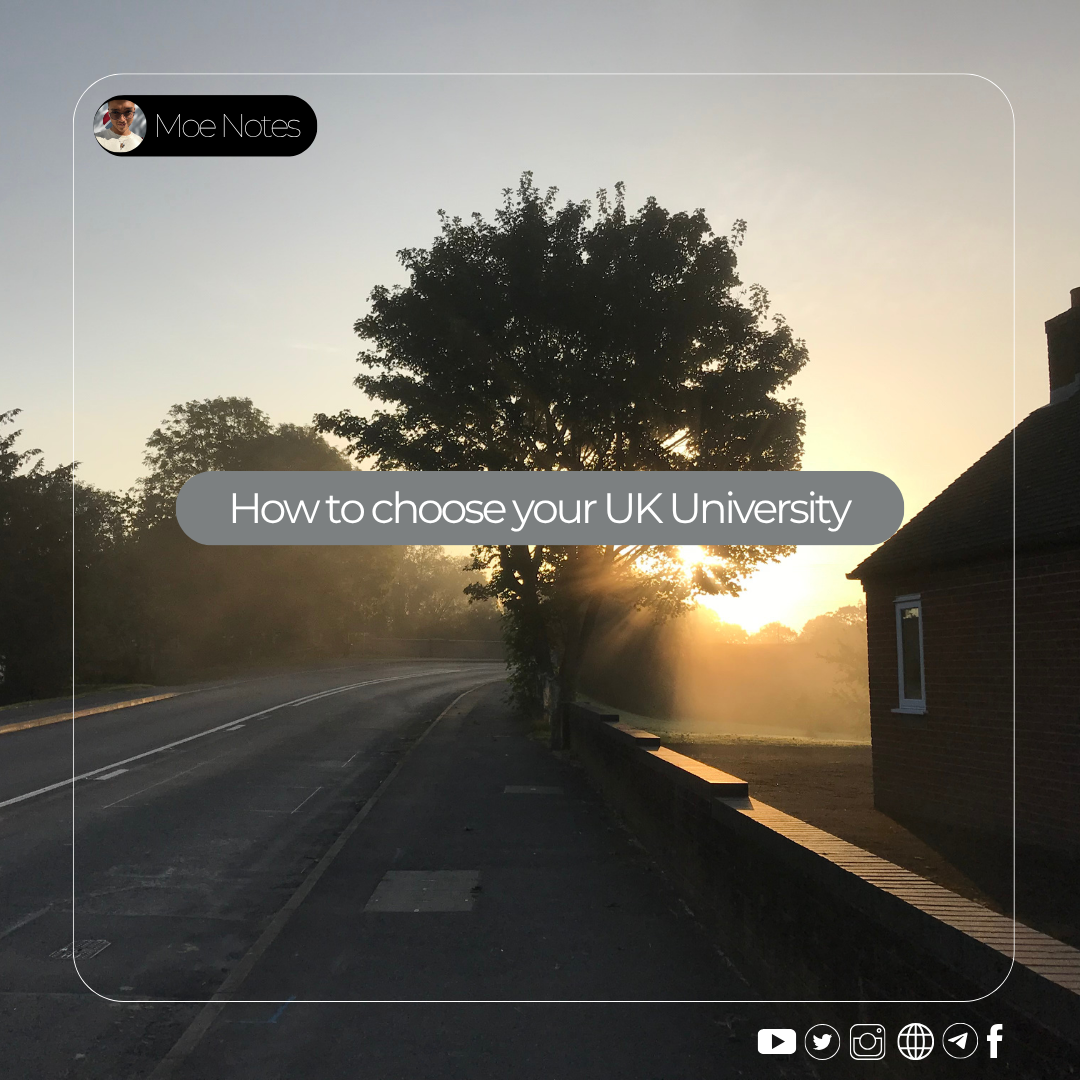A Burmese Student’s Guide to UK Universities: Choosing Your Path

"This path isn't one I'd define as the 'best' path. It's simply the one I chose from the many that were available."
(Read Time: 25 Minutes)
This article is also available in [Burmese]
“Why did you choose the UK?” “Is Oxford Brookes a good university?” “How do I apply?”
These are the questions that constantly fill my inbox. Today, using my own experiences as a foundation, I want to break down why choosing a university in the UK is about more than just picking a subject, and how the type of university you choose can fundamentally shape your future.
This isn’t the advice of an education consultant. It’s the honest analysis of one student among the more than 750,000 international students at over 160 universities in the UK.
Part 1: The Three Tiers of UK Universities
While there are hundreds of universities in the UK, they cannot all be compared on the same level. They can be categorized into three main tiers.
1. The Elite Tier (Russell Group) - World-Class Research Universities
- Who are they? This is the UK’s equivalent of the Ivy League. It’s a group of 24 world-renowned universities focused on research, including institutions like the University of Oxford, Cambridge, Imperial College London, and Queen’s University Belfast, which I applied to. (Fact: Russell Group universities conduct over 65% of the UK’s world-leading research, and their graduates tend to earn, on average, 10% more over a lifetime than graduates from other universities.)
- Pros: They have immense global prestige and are highly recognized by top companies worldwide. They are powerful in research and academia.
- Cons: Entry requirements are incredibly high (requiring grades like A*A*A or A*AA at A-Level). Some argue that their teaching style is more theoretical, which can be a disadvantage for practical application. Tuition and living costs are also often higher.
- Who is it for? Best suited for “try-hard” students who want to study a subject in great depth, aim for a career in research or academia, and are driven by intense academic rigour.
2. The Practical Tier (Modern / Post-92 Universities) - Universities Focused on Employability
- Who are they? These are institutions like Oxford Brookes, the University of Portsmouth, and UWE Bristol, which were formerly polytechnic colleges and were granted university status after 1992. They prioritize practical application and employability over pure research.
- Pros: They have strong connections with industry, and their teaching style encourages hands-on projects and internships. (Fact: Many of these universities boast that over 90% of their graduates are in employment or further study within 15 months of graduating.) Their entry requirements are more practical than the Russell Group’s (e.g., ABB or BBB at A-Level).
- Cons: Their overall global ranking is not as high as that of the Russell Group.
- Who is it for? Perfect for students seeking to acquire practical skills for immediate entry into the workforce after graduation, and who prefer to learn their subject through hands-on projects.
3. The “Degree-Focused” Tier (Colleges & Lower-Ranking Universities)
- Who are they? This category includes institutions of varying quality. While some colleges may excel in a specific subject, others have very low entry requirements and are often attended by students whose primary goal is to obtain a degree.
- Pros: It’s very easy to get admitted, and tuition fees may be lower.
- Cons: The quality of teaching and facilities can be weak. Recognition from employers after graduation may be limited. The environment may not be conducive for a motivated student, as many of the other students may not be focused on their education.
- Who is it for? For those whose primary objective is to gain the right to live in the UK and to get a degree certificate.
Part 2: Your Goal - To Survive vs. To Thrive
Before choosing a university, you must first ask yourself the most crucial question: “Why am I coming to the UK?”
- Is it to survive? If your goal is to get residency in the UK and to live an average life with a degree, then choosing an easy-to-enter, low-cost university might be an option. But this path may limit you to an average, middle-tier life.
- Is it to thrive? If you want to establish yourself as a professional in this country, compete on an equal footing with the locals, and strive to be at the top of your field, then your choice of university is different. If you want to be an “insider,” not an “outsider,” you should aim for a Russell Group or a Top-tier Modern University that has a strong reputation in your subject and solid industry connections.
Part 3: The Illusion of Rankings - Overall vs. Subject
The biggest mistake most people make when choosing a university is looking only at the Overall Ranking.
- Overall Ranking: This is calculated based on many factors, including the university’s research output, student satisfaction, and the number of international students.
- Subject Ranking: This is a specific ranking for the single subject you want to study.
Oxford Brookes is the perfect Example to understand this point. Its Overall Ranking in the UK is in the middle tier (around the Top 50), but for Architecture, it is consistently ranked in the UK’s Top 10 or Top 15 (ranked 12th in the Guardian University Guide 2025). This is because its teaching style, the quality of its tutors, and its industry connections are perfect for this specific subject.
However, if you were to study Finance at Oxford Brookes, it might not be the best choice for you (ranked 57th in the Complete University Guide 2025). Therefore, look at the Subject Ranking for your chosen major first, and only then consider the Overall Ranking.
Part 4: The Typical Timeline for Applying to UK Universities
- Year 12 (or equivalent): Begin researching universities and subjects. Start drafting your Statement.
- September - January (Year 13): Submit your application through UCAS (Universities and Colleges Admissions Service).
- January - May: Receive Conditional Offers or Unconditional Offers from universities.
- May - June: Choose your Firm Choice (your top preference) and Insurance Choice (your backup) from the offers you’ve received.
- August (Results Day): Your final exam results are released, and you find out if your Conditional Offer has been confirmed as an Unconditional Offer.
Part 5: My Personal University Application Journey
I applied to seven universities in the UK.
- Main Choices: University of Salford, Oxford Brookes University, Queen’s University Belfast
- Second Options: UWE Bristol, University of Portsmouth, University of Huddersfield, University of East London
I received offers from all of them. I didn’t just apply to top-tier schools; I applied strategically to a mix of universities that matched my grades and some that were a safe bet. Although Queen’s University Belfast is a Russell Group university, I didn’t choose it because I felt the city was too quiet and wouldn’t be a good fit for me.
Challenges: I faced many challenges during the application process. Each university had different document requirements and submission formats, which were confusing. At the same time, I was juggling assignments from my OSSD school and preparing for the IELTS exam, so I was constantly short on time.
The Architecture Portfolio Submission: Arts courses like Architecture require a portfolio. You have to compile all the drawings, writings, and models you’ve ever made. As someone who doesn’t love drawing, I had to force myself to draw more than I ever wanted to.
Part 6: Life After the Gown - The Three-Year Sprint
It’s easy to think of university as the final destination. It’s not. It’s a three-year sprint that feels like a lifetime when you’re in it, but vanishes in the blink of an eye once it’s over. Yes, these three years can change your entire life, but only if you are disciplined and work hard.
Many students fall into the trap of thinking that just getting the degree is enough. They drift through their courses, do the bare minimum to pass, and believe that the university’s reputation will magically open doors for them. Then, graduation day comes. They have a bachelor’s or master’s degree in hand, but they stand on the stage with a terrifying emptiness, still having no idea what’s going on or what to do with the expensive piece of paper they’ve just received. They don’t realize that time flies until it has already flown.
“Employability” isn’t a passive quality the university gives you; it’s something you must actively build every single day. It means:
- Using the university’s career services from Year One, not just in your final months.
- Actively seeking internships during your summer breaks.
- Networking with professors and guest lecturers who are professionals in your field.
- Building a portfolio of work that goes beyond your required assignments.
A degree certificate proves you can pass exams. Your portfolio, your network, and your work ethic are what will get you a job. Don’t wake up in your final year, realizing you have a degree but no direction. The race to your future starts the day you arrive, not the day you graduate.
Part 7: Conclusion: Your Choice, Your Future
In the end, choosing a university is about more than just rankings and prestige. It’s a question you have to ask yourself: “What kind of person do I want to become? In what kind of environment do I want to learn? What kind of future do I want to build?”
This guide won’t give you a ready-made answer, but I hope it helps you to start asking the right questions.
Part 8: References
- Universities UK: “Higher Education in Facts and Figures 2023” - For the number of universities and international student statistics in the UK.
- Higher Education Statistics Agency (HESA): “Student data 2022/23” - For precise international student numbers.
- The Russell Group: “The economic impact of the Russell Group” report - For statistics on research and graduate earnings.
- The Guardian University Guide 2025: For rankings related to the Architecture subject.
- The Complete University Guide 2026: For rankings related to Finance and other subjects.
- UCAS (Universities and Colleges Admissions Service): For the timeline and process of applying to UK universities.



